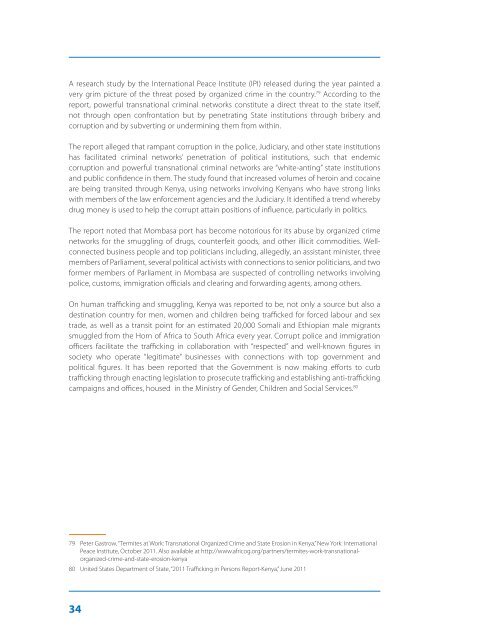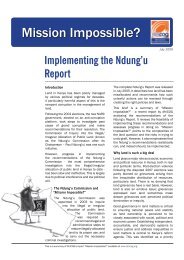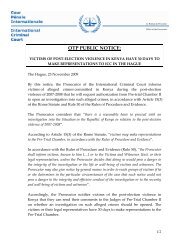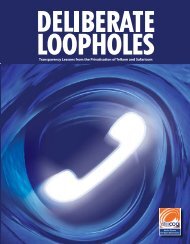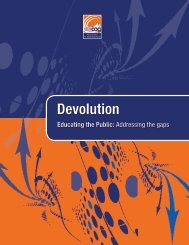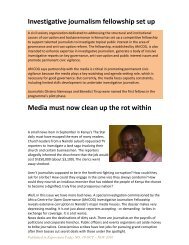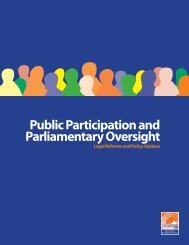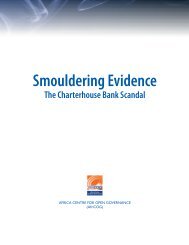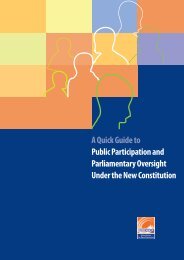Untitled - Africa Centre for Open Governance
Untitled - Africa Centre for Open Governance
Untitled - Africa Centre for Open Governance
Create successful ePaper yourself
Turn your PDF publications into a flip-book with our unique Google optimized e-Paper software.
A research study by the International Peace Institute (IPI) released during the year painted a<br />
very grim picture of the threat posed by organized crime in the country. 79 According to the<br />
report, powerful transnational criminal networks constitute a direct threat to the state itself,<br />
not through open confrontation but by penetrating State institutions through bribery and<br />
corruption and by subverting or undermining them from within.<br />
The report alleged that rampant corruption in the police, Judiciary, and other state institutions<br />
has facilitated criminal networks’ penetration of political institutions, such that endemic<br />
corruption and powerful transnational criminal networks are “white-anting” state institutions<br />
and public confidence in them. The study found that increased volumes of heroin and cocaine<br />
are being transited through Kenya, using networks involving Kenyans who have strong links<br />
with members of the law en<strong>for</strong>cement agencies and the Judiciary. It identified a trend whereby<br />
drug money is used to help the corrupt attain positions of influence, particularly in politics.<br />
The report noted that Mombasa port has become notorious <strong>for</strong> its abuse by organized crime<br />
networks <strong>for</strong> the smuggling of drugs, counterfeit goods, and other illicit commodities. Wellconnected<br />
business people and top politicians including, allegedly, an assistant minister, three<br />
members of Parliament, several political activists with connections to senior politicians, and two<br />
<strong>for</strong>mer members of Parliament in Mombasa are suspected of controlling networks involving<br />
police, customs, immigration officials and clearing and <strong>for</strong>warding agents, among others.<br />
On human trafficking and smuggling, Kenya was reported to be, not only a source but also a<br />
destination country <strong>for</strong> men, women and children being trafficked <strong>for</strong> <strong>for</strong>ced labour and sex<br />
trade, as well as a transit point <strong>for</strong> an estimated 20,000 Somali and Ethiopian male migrants<br />
smuggled from the Horn of <strong>Africa</strong> to South <strong>Africa</strong> every year. Corrupt police and immigration<br />
officers facilitate the trafficking in collaboration with “respected” and well-known figures in<br />
society who operate “legitimate” businesses with connections with top government and<br />
political figures. It has been reported that the Government is now making ef<strong>for</strong>ts to curb<br />
trafficking through enacting legislation to prosecute trafficking and establishing anti-trafficking<br />
campaigns and offices, housed in the Ministry of Gender, Children and Social Services. 80<br />
79 Peter Gastrow, “Termites at Work: Transnational Organized Crime and State Erosion in Kenya,” New York: International<br />
Peace Institute, October 2011. Also available at http://www.africog.org/partners/termites-work-transnationalorganized-crime-and-state-erosion-kenya<br />
80 United States Department of State, “2011 Trafficking in Persons Report-Kenya,” June 2011<br />
34


